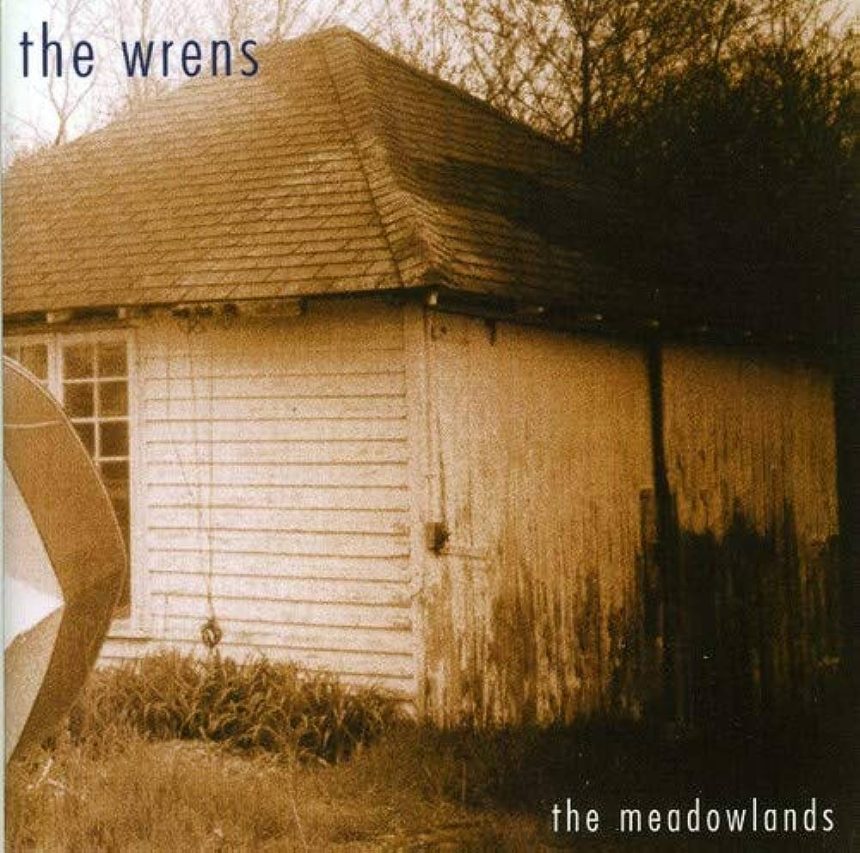It starts with the crickets. Any suburban sad sack knows the sound well, the din a harbinger of those boggy nights full of alternating freedom and boredom. Guitars ring out; a ghostly voice intones: “It’s been so long/Since you’ve heard from me/Got a wife and kids/That I never see.” The voice belongs to Jerry MacDonald, drummer for the mercurial New Jersey rock band The Wrens; at the time he was the only band member married. The other three–Charles Bissell on guitars and vocals, and brothers Kevin Whelan on keys, bass, and vocals, and Greg Whelan on guitar–shared a small house together in Fort Lee where they’d write and record (and re-record) the ideas that would become their landmark third album The Meadowlands, which turns 20 this week. And it had been a long time–seven years in fact–since their last proper full length.
In 1997, The Wrens found themselves at a crossroads. The year prior they’d released Secaucus, an hour of frenzied power pop packed with left field decisions, on the notable indie label Grass Records. But Grass was then acquired by business mogul Alan Meltzer, who heard dollar signs in The Wrens’ layers of spiky hooks. He offered them a new, long-term deal on the condition they tailor their sound for radio, which they refused. Meltzer cleaned house at the label and Grass was reborn as Wind-Up, later becoming famous for signing Creed and Evanescence; The Wrens were subsequently dropped. During interviews in the ensuing years, band members have estimated that the deal they turned down was worth a million dollars.
Then an A&R at Interscope named Steve Ralbovsky caught wind of the band and began courting them. Unlike Meltzer, he wasn’t offering an advance; he needed to hear the songs upfront before paying for any expenses. The Wrens hunkered down to demo 30 or so songs but were told they still needed to write a hit. After nearly a cumulative half-decade of flirting with mainstream success, they were fed up. Ralbovsky set a date for a listening session and tasked the band to bring a radio single. Bissell–one of The Wrens’ two primary songwriters–cooked up a new song, laden with distortion per the label’s request and laced with barbs directly referencing the band’s frustration with Ralbovsky. This new song would appear, reworked, on The Meadowlands as “This Boy is Exhausted.” Ralbovsky didn’t sign The Wrens–he was later laid off from Interscope in a merger before ultimately signing The Strokes to RCA. His assistant reportedly loved thte demo.
What do four men in a rock band north of 30 do after losing out on a second life-changing opportunity in as many years? Get drunk, of course. But then they started on a follow up to Secaucus, “one last job” so to speak. They would record on their own time, in their own home, with their own equipment. No pesky A&Rs or label executives watching over, demanding changes or inquiring about deadlines; no outside producers cashing checks and mucking up the workflow. Despite their years of touring, The Wrens mostly played to small rock-club audiences even in their home state. They knew it was unlikely anybody would care about–or even hear–this new album other than a handful of close friends and devoted fans. They knew this could very well be the last of The Wrens.
They began tracking drums in early 1999, with Bissell behind the boards. MacDonald was now living outside of Philadelphia with his wife and young children, commuting several hours each way to his job at a pharmaceutical company in New York and stopping by the house in Fort Lee when he could to record (“We are kind of the mafia,” he once joked to Pitchfork about the circumstances of these sessions. “Nobody is allowed to leave.”). Bissell and the Whelan brothers added their contributions over the next several months and, with Bissell providing his trademark endless overdubs, the songs began to take shape. Then–in what would become a defining facet of the band’s next several decades–The Wrens began to have doubts. Were the songs good enough to be an epitaph? The four members agreed: “If you have to ask, the answer is no.”
But they also agreed that MacDonald’s drum tracks were perfect. Not necessarily in tempo, or rhythm, or any of the other metrics by which a normal band might measure drums: you need only to make it to “Happy”, the album’s second track–and the first to feature drums–to hear that the groove rushes and drags, slipping in and out of pocket with the bass. But MacDonald had tapped into something ineffable, the audible strain in his unsteady thrum a perfect underscore to Kevin Whelan’s slow build lyrics about a breakup. Bissell heard it in his own guitar take as well, which he deemed full of “fluky mistakes and inconsistencies” that he painstakingly recreated during overdubs. These errant notes crop up all over the song, and it’s a bit like watching a car with a broken starter motor get pushed down the street. With every engine sputter you fear they might not make it, but when the song snaps in the final minute it’s as if the ignition catches and everyone rides off triumphantly into the sunset, a moment made all the better by the preceding uncertainty. “Happy” is one of the only songs on The Meadowlands to appear largely in its original form; most of the others were tinkered with for years between tracking and release. But as The Wrens rearranged and overdubbed and drove themselves mad, they kept MacDonald’s original drums in place.
By 2003 they were ready to release The Meadowlands. Kevin Whelan had an epiphany while walking to work, listening to the umpteenth round of mixes on a portable CD player: “I think this is pretty good!” So he phoned up Bissell from his office, and they started making plans to put the record out. They originally planned to release the album on Drive Thru Records, an upstart label run by their friends Richard and Stefanie Reines. They even released early Meadowlands demos on the 1999 Drive Thru compilation You’ll Never Eat Fast Food Again, alongside pop punk stalwarts like New Found Glory and Midtown. But in 2000 Drive Thru signed a distribution deal with MCA which introduced serious financial stakes and–at least in The Wrens’ minds–threatened to compromise the independence they had fought so hard for. That left them with only one viable suitor: Cory Brown, and his nascent label Absolutely Kosher. Brown had found a copy of the band’s 1994 debut Silver in a dollar bin at a used record store. He loved it so much he began buying every used copy of a Wrens album he could find, passing them out to friends like an indie rock Jehovah’s Witness. A longtime Californian, Brown met the band on a West Coast tour and hit them up incessantly offering to release anything they put out. Between their bad experiences with bigger labels and their own modest expectations for sales, The Wrens decided to take him up on his offer.
“The House That Guilt Built” pulls a neat little trick, deploying a series of false endings like the guitar is a wounded animal struggling to stand, before fading neatly into “Happy”. You’d have to imagine that at least a few longtime followers were a bit nonplussed at the slow start. Gone were the serrated, noisy character sketches about serial killers and divorcées. These new songs leaned into the band’s unparalleled gift for melody and sounded encased in mildew and reverb, conjured from the ether like a memory you may have dreamed up. “This Boy is Exhausted”, the song written to spite Ralbovsky, appears here in a re-tooled form. The Marshall-stack distortion of the choruses was replaced with sonorous baritone guitar; vocal melodies became riffs; some of the more pointed lines about profit and loss sheets were swapped out. In its new incarnation the song becomes an ode to their friendship. They may be broke and exhausted, bereft of marketable resume skills, but the occasional exhilarating show pays off the struggle. “I guess we’re done”, Bissell sings, after name-checking each of his bandmates’ contributions, “‘cause every win on this record’s hard won”.
As songwriters, Bissell and Kevin Whelan were perfect complements, two stylistically different lyricists and musicians who cohered into a whole greater than the sum of its parts. Whelan studied classical piano, influenced at an early age by Liberace–he painted in broader strokes, writing directly to a universal audience and marrying his words to immediate, anthemic pop melodies. Bissell majored in jazz guitar, and tended to be more ornamental, circuitous. An avowed poetry nerd, he clipped and bent phrases into elliptical shapes and layered shards of guitar noise on top of them. Contrasting Bissell’s knotty storytelling with Whelan’s fist-pumping choruses brought out the best in both writers, each approach highlighting the merit of the other. Not to mention the ways in which they augmented each other’s songs as well: Bissell adorning Whelan’s tunefulness with muted harmonies and six-string countermelodies, Whelan’s steady refrains keeping Bissell’s wildest ideas terrestrial.
To wit, Whelan had written another breakup song, ironically the brightest pop song of the band’s career. Over a chiming guitar ostinato and a pulsing drum beat he takes palpable joy in the breakthrough of knowing a relationship has run its course and leaving a girlfriend who has been treating him terribly. This was the hit that the endless parade of industry ghouls had chased from this band; naturally it was titled “Hopeless”. Whelan’s voice was also submerged in the ever mounting sea of guitar and keys and synths which, far from dulling the song’s anthemic power, allows the listener to embody it. All across the album, in fact, the lyrics are consistently low in the mix, situating the listener in the rehearsal space, in the recording booth, on the stage with the band. Such is also the case with the Bissell-penned “Ex-Girl Collection”, an acerbic tale of an emotionally stunted womanizer who mistreats his lovers because he’s hung up on another woman (in modern parlance, a “fuckboy”). Bissell lets the girls get in all the haymakers, but still grants some empathy to the hangdog narrator–after all, who among us hasn’t carried lingering feelings into a new relationship? Here, too, Bissell’s voice is suspended amid a spider web of interlocked guitar parts, just one melody among many.
The record hits its emotional apex with “Everyone Chooses Sides”, a firsthand account of the band’s struggles to get even this far. Bissell bemoans the unstable life he and his friends have made for themselves (“Thirteen grand/A year in the Meadowlands/Bored a rural poor/lord, at 35 right?/I am the best seventeen year old ever”), poking a little fun at the practical realities of living the teenage dream. But from the opening fuzzed out riff it was clear that they stood resolute. Yes, they were reeling, from the peers they watched succeed in their stead, from the long nights hunched over equipment, toiling away on an album that probably meant the end for the band. But faced with a chance to admit defeat, they choose defiance: “I’ve walked away from more than you imagine/And I sleep just fine.” “Everyone Chooses Sides” carries an indignance born from turning down seven-figure deals and re-emerging with the gumption to raise yet another middle finger.
Twenty years have passed since The Meadowlands was released, which means twenty years have been spent trying to understand why it inspires such rapt devotion from fans. The mythology of its creation certainly plays a part, as well as the long wait for a follow up and increasing likelihood that a proper one will never materialize. In late 2021, The Wrens cleaved into two new projects: Bissell’s yet to be named solo outfit, and Aeon Station, comprising the other three members. The latter released Observatory in December of that year, made up equally of songs slated for the fourth Wrens album and songs written shortly after the split. Bissell has steadily promised new music, both under the band’s name and his own, since roughly 2006, but none has materialized. He posted a photo of a test pressing for his forthcoming solo album this past Labor Day weekend.
Beyond that, though, The Wrens always went above and beyond to embrace their fans. At their live shows, The Wrens encouraged audience participation at all turns. Having overdubbed The Meadowlands beyond the capabilities of four stage musicians, they invited fans to apply for “Fifth Wren” duty at each show to flesh out the live sound. During “Boys You Won’t,” they’d invite tens of fans onstage, pass out drumsticks, and have them play supplementary percussion. The Wrens understood the improbable odds behind their success, and saw those who weren’t as lucky singing back at them every time they took the stage, graciously extending the audience a chance to bask in that same fleeting, weird exhilaration. They responded to fan emails diligently, hung out for drinks after shows, and even once performed a one-off song in someone’s living room. They also wrote killer songs about the universal experience of middle age, wondering if you have as many of your best days in front of you as behind you, or if your best days were worth living for at all. Real life isn’t the movies, with redemption arcs and storybook endings. Most people live life day-to-day, week-to-week, shrugging through adversities with no promise of deliverance on the other side. The Wrens made anthems out of those shrugs, imbuing that daily struggle with the kind of cinematic catharsis that listeners could return to again and again.
Kevin Whelan gets the last word in on The Meadowlands, the short tune “This is Not What You Had Planned.” Returning home from a night at the bar sometime in the early 2000s, he felt a burning urge to scream into the void. He whirred the band’s living room studio to life and dragged the microphone, recording, over to his keyboard. He’s still drinking at this point–you can just make out a glass clinking deep in the mix. Whelan starts plinking at the notes, making the words up as he goes (“Something isn’t just quite how you planned…”). It’s ironic that, after the pains taken to wrest control of their sound and story, The Wrens would close with an impromptu song recorded in a single take. But after one listen to Whelan screaming out the final lines, stretching the word “babe” for all it’s worth, it makes perfect sense. Even if you get that storybook ending, there’s no guarantee you don’t fall flat on your face right after. Some things just don’t turn out how you planned.









